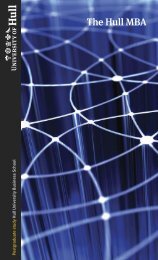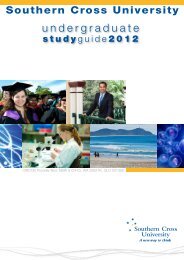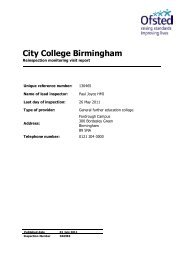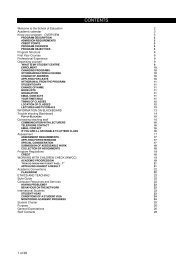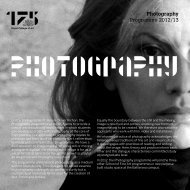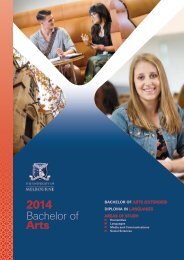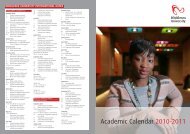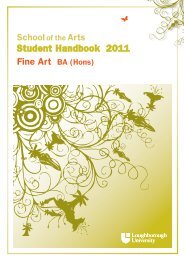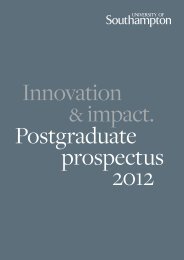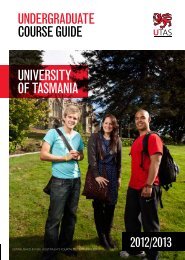Academic calendar Academic calendar - Study in the UK
Academic calendar Academic calendar - Study in the UK
Academic calendar Academic calendar - Study in the UK
Create successful ePaper yourself
Turn your PDF publications into a flip-book with our unique Google optimized e-Paper software.
Philosophy<br />
General Major: (10 courses)<br />
• PHL-121; 122; 238; 245; 337;<br />
• Two of PHL-230, 232, 234;<br />
• One of PHL-321, 323, 340, 343, 345, 355, 366, 370, 385;<br />
• Two PHL-300-level electives<br />
M<strong>in</strong>or: (6 courses)<br />
• PHL-121; 122; 337;<br />
• One of PHL-230, 232, 234;<br />
• One of PHL-238 or 245;<br />
• One PHL-300-level elective<br />
PHL-121 Introduction to Philosophy<br />
(F/W)<br />
Previously offered as PHL-201. An exam<strong>in</strong>ation of philosophy and its<br />
place <strong>in</strong> our culture, with special emphasis on ethics, <strong>the</strong> question of<br />
<strong>the</strong> soul, <strong>the</strong> nature of truth, especially as it relates to science. Basic<br />
dist<strong>in</strong>ctions and categories for deal<strong>in</strong>g philosophically with created<br />
reality are developed.<br />
PHL-122 Logic<br />
(W)<br />
This course <strong>in</strong>troduces students to logic - both deduction and<br />
<strong>in</strong>duction - and develops critical th<strong>in</strong>k<strong>in</strong>g skills <strong>in</strong> relation to arguments<br />
and <strong>the</strong>ir evaluation. Students will exam<strong>in</strong>e <strong>the</strong> role of worldview <strong>in</strong><br />
relation to logic and arguments and learn to compose cogent written<br />
arguments. The course will cover such topics as <strong>the</strong> importance of<br />
language, logical fallacies, sources of authority, and elementary<br />
philosophical concepts and categories.<br />
Prerequisite: PHL-121<br />
PHL-230 Ancient World Philosophy *<br />
Ancient world philosophy concentrates on <strong>the</strong> emergence of Western<br />
philosophy from Thales to August<strong>in</strong>e while also tak<strong>in</strong>g account of<br />
major ancient philosophies <strong>in</strong> <strong>the</strong> non-Western traditions such as<br />
H<strong>in</strong>duism, Buddhism, Confucianism and Taoism.<br />
Prerequisite: PHL-121<br />
PHL-232 Medieval and Early Modern Philosophy<br />
This course explores <strong>the</strong> development of Western philosophy<br />
from August<strong>in</strong>e to Aqu<strong>in</strong>as and <strong>the</strong>n through <strong>the</strong> Renaissance and<br />
Reformation on to <strong>the</strong> emergence of early modern philosophy.<br />
Prerequisite: PHL-121<br />
(F)*<br />
PHL-234 Late Modern and Contemporary Philosophy<br />
(W)*<br />
This course exam<strong>in</strong>es <strong>the</strong> development of Western philosophy<br />
from <strong>the</strong> mid-eighteenth century (Bentham) until <strong>the</strong> present, with<br />
close attention to <strong>the</strong> rise of postmodernism and <strong>the</strong> contemporary<br />
resurgence of Christian philosophy.<br />
Prerequisite: PHL-121<br />
PHL-238 Metaphysics<br />
(F)*<br />
Students will study <strong>the</strong> nature, constitution, and structure of reality.<br />
We will discuss grand <strong>the</strong>ories of everyth<strong>in</strong>g, such as metaphysical<br />
materialism, idealism and metaphysical dualism. We will also<br />
discuss <strong>the</strong> differences between existence and essence, and between<br />
substance, properties, accidents and bundles. We will clarify important<br />
dist<strong>in</strong>ctions between metaphysical realism and nom<strong>in</strong>alism, and<br />
between universals and particulars. Topics will extend to fundamental<br />
issues about personal identity, <strong>the</strong> nature of eternity and time, necessity<br />
and possibility, and o<strong>the</strong>rs.<br />
Prerequisite: PHL-121 and 122<br />
PHL-245 Epistemology *<br />
This course exam<strong>in</strong>es <strong>the</strong> development of epistomology <strong>in</strong> <strong>the</strong><br />
Western philosophical tradition with a particular focus on modern<br />
epistomology. At a systematic level <strong>the</strong> focus will be on <strong>the</strong> <strong>the</strong>ory<br />
of <strong>the</strong>oriz<strong>in</strong>g <strong>in</strong> <strong>the</strong> Reformational tradition and <strong>the</strong> Reformed<br />
Epistomology of Plant<strong>in</strong>ga and Wolterstorff.<br />
Prerequisite: PHL-121 and 122<br />
PHL-248 Aes<strong>the</strong>tics<br />
(F)*<br />
A philosophical consideration of art and art criticism, draw<strong>in</strong>g on both<br />
classical and contemporary th<strong>in</strong>kers. Topics <strong>in</strong>clude beauty, expression,<br />
representation, aes<strong>the</strong>tic distance, <strong>the</strong> identity of <strong>the</strong> work of art, <strong>the</strong><br />
relation of art to morality and <strong>the</strong> <strong>in</strong>fluence of art on perception.<br />
Prerequisite: PHL-121<br />
PHL-314 Philosophy of Science<br />
(W)<br />
Previously offered as PHL-342. A study of philosophical problems<br />
aris<strong>in</strong>g out of <strong>the</strong> presuppositions, methods and results of <strong>the</strong> natural<br />
sciences. The focus is on biology, with selected topics from physics<br />
and chemistry. Topics <strong>in</strong>clude <strong>the</strong> role of religious commitments,<br />
<strong>the</strong> nature and development of knowledge, perception, <strong>the</strong> nature of<br />
science, <strong>the</strong> relation between <strong>the</strong>ory and observation, and <strong>the</strong> sociology<br />
of science.<br />
Prerequisite: PHL-121 and HIS-313<br />
PHL-321 Ancient and Medieval Political Theory (POL-321) *<br />
PHL-323 Modern Political Theory (POL-323) *<br />
PHL-337 Philosophical Ethics (Capstone)<br />
(W)*<br />
A consideration of <strong>the</strong> foundations of moral reflection, draw<strong>in</strong>g on<br />
sources <strong>in</strong> ancient and contemporary philosophical reflection <strong>in</strong><br />
both <strong>the</strong> Western world and Asia. The emphasis falls on <strong>the</strong> general<br />
pr<strong>in</strong>ciples underly<strong>in</strong>g good conduct and <strong>the</strong> good life (i.e. <strong>the</strong> notion of<br />
autonomy) ra<strong>the</strong>r than on responses to specific moral issues of our day.<br />
Prerequisite: Year 3 or 4 stand<strong>in</strong>g. PHL-337 is <strong>the</strong> Capstone Course for <strong>the</strong> Philosophy<br />
Department and is required for all majors <strong>in</strong> <strong>the</strong> 3rd or 4th year.<br />
PHL-340 Philosophy of Religion (REL-340) *<br />
Previously offered as PHL-240. A treatment of philosophical issues<br />
as <strong>the</strong>y arise <strong>in</strong> religious experience and <strong>in</strong> <strong>the</strong>ological thought, such<br />
as <strong>the</strong> nature of religious language, <strong>the</strong> enterprise of prov<strong>in</strong>g God’s<br />
existence, and <strong>the</strong> prospect of def<strong>in</strong><strong>in</strong>g or circumscrib<strong>in</strong>g religion.<br />
Prerequisite: PHL-121<br />
104



